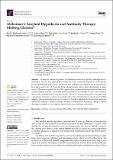Alzheimer’s Amyloid Hypothesis and Antibody Therapy: Melting Glaciers?
Author(s)
Høilund-Carlsen, Poul F.; Alavi, Abass; Castellani, Rudolph J.; Neve, Rachael L.; Perry, George; Revheim, Mona-Elisabeth; Barrio, Jorge R.; ... Show more Show less
Downloadijms-25-03892-v3.pdf (5.096Mb)
Publisher with Creative Commons License
Publisher with Creative Commons License
Creative Commons Attribution
Terms of use
Metadata
Show full item recordAbstract
The amyloid cascade hypothesis for Alzheimer’s disease is still alive, although heavily challenged. Effective anti-amyloid immunotherapy would confirm the hypothesis’ claim that the protein amyloid-beta is the cause of the disease. Two antibodies, aducanumab and lecanemab, have been approved by the U.S. Food and Drug Administration, while a third, donanemab, is under review. The main argument for the FDA approvals is a presumed therapy-induced removal of cerebral amyloid deposits. Lecanemab and donanemab are also thought to cause some statistical delay in the determination of cognitive decline. However, clinical efficacy that is less than with conventional treatment, selection of amyloid-positive trial patients with non-specific amyloid-PET imaging, and uncertain therapy-induced removal of cerebral amyloids in clinical trials cast doubt on this anti-Alzheimer’s antibody therapy and hence on the amyloid hypothesis, calling for a more thorough investigation of the negative impact of this type of therapy on the brain.
Date issued
2024-03-31Department
Massachusetts Institute of Technology. Department of Brain and Cognitive SciencesJournal
International Journal of Molecular Sciecnes
Publisher
MDPI AG
Citation
Høilund-Carlsen PF, Alavi A, Castellani RJ, Neve RL, Perry G, Revheim M-E, Barrio JR. Alzheimer’s Amyloid Hypothesis and Antibody Therapy: Melting Glaciers? International Journal of Molecular Sciences. 2024; 25(7):3892.
Version: Final published version
ISSN
1422-0067
Keywords
Inorganic Chemistry, Organic Chemistry, Physical and Theoretical Chemistry, Computer Science Applications, Spectroscopy, Molecular Biology, General Medicine, Catalysis